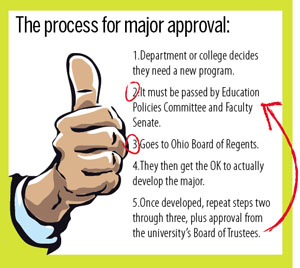Employer demand, faculty research dictate development of new KSU programs
January 26, 2012
While the development of a new major seems to be creative in nature, it is the practical economic terms “supply” and “demand” that come into play when a program is suggested.
“If a unit is putting forth a new major, they have to show there is a demand for it,” said Stephane Booth, associate provost in charge of quality initiative and curriculum.
Booth said this demand comes from the faculty, who oftentimes hear what employers are looking for in graduates.
“There is an evolving need based on the market,” she said.
Though each college and school at the university has a set time when they review their programs and curriculum, the college can identify when a major needs to be created or modified, Booth said this is often an ongoing process.
A lot of times the solution is not always developing an entirely new major. Booth said the majority of the time colleges and departments are tweaking and modernizing their programs to meet what future employers are looking for, or what the accrediting agency wants.
Booth said some possible “tweaks” include adding concentrations, minors or additional coursework. Sometimes the change is as simple as modernizing the name of the major itself.
“A lot of the names spoke to people in my generation,” Booth said.
The process
When a new major is the answer for a college, there is a several year process that is undertaken before it can be offered to students.
Booth said this process, at the undergraduate level, begins with conducting a needs analysis for the discipline. This includes measuring the demand in the area and the general demand from the Department of Labor for that particular job set.
After that, the proposal for the major is presented at the university and state levels before it can be developed. Once it is approved and developed, it must go before the same boards before it can then be offered.
The outcome
The most recent new program is the School of Digital Sciences, which opened its doors in Fall 2011 and had been in the works since Fall 2010.
Robert Walker, the director of the School of Digital Sciences and a computer science professor, said the school is unique because it is an interdisciplinary college with professors from varying disciplines around the university teaching topics related to technology.
Walker used the example of a student taking a class from a computer science professor, a journalism professor and an architecture professor all in one day, all relating to their major. He said the goal of the school is to produce a graduate with knowledge of a wide range of technological things that could be applied across the spectrum.
“These are the people that know how technology is used in different organizations,” Walker said.
Booth said faculty from around the entire university came together to put the School of Digital Sciences together.
Also, the school is unique in that it is an independent school not under the umbrella of a college or department, Booth said.
As of right now, Walker said that the school has about 25 undergraduates and eight graduates. Most of the current students were already enrolled, but have switched from other majors, like exploratory. Walker said, essentially, Fall 2012 will be the first semester welcoming new students.
“That will be our first opening blast,” he said.
In the future
Fall 2012 will see a lot of new majors debuting at regional campuses — including insurance studies at Salem and agra-business at Tuscarawas.
While Therese Tillett, director of curriculum services, said a new major isn’t more likely to occur at a regional campus, they do have a distinct advantage.
“They really have to be attuned to their communities,” she said.
On main campus, an engineering technology major will be offered in the Fall. Though it was already a concentration, Tillett said it would allow students to choose more specific concentrations within engineering technology, including game design and animation.
In the later future, Tillett said a major would be offered in construction management at main campus and sustainable landscape site design at Salem.
Contact Meghan Bogardus at [email protected].












